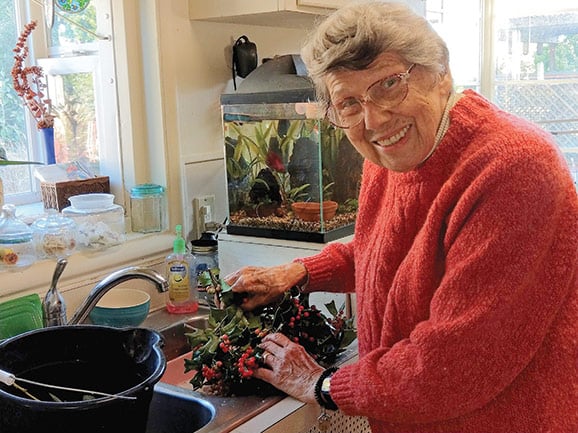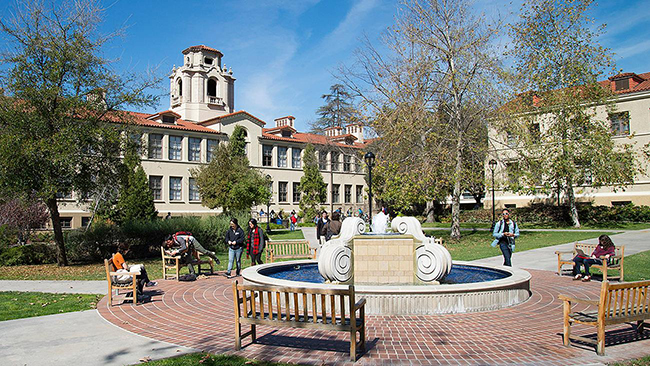Devoting her life to the service of others

by Mick Rhodes | mickrhodes@claremont-courier.com
With the Pilgrim Place Festival cancelled this year due to the COVID pandemic, the community is lacking a beloved tradition that has charmed and entertained untold thousands since its 1949 inception.
And not only are we missing out on Claremont’s own fall classic, with its refreshingly mellow, handmade aesthetic infused in everything from homemade jams and pies, antiques, art, kids activities to entertainment, the festival’s purveyors—Pilgrim Place residents all—are also feeling the melancholy.
One in particular, Ruth Brown, a 20-year Pilgrim Place resident, is sure to be missed.
Ms. Brown, 92, is known around the campus a “the craft lady.” Her handmade wreaths, intricately decorated greeting cards and folded tea bag medallions, among others, have been helped raise tens of thousands of dollars for Pilgrim Place over the years.
This year though, she and the rest of the small army of volunteers that make the festival happen are on hold.
But Ms. Brown, reached by phone last week, wasn’t dwelling on what’s been lost.
“I’m not really working that hard on 
Her craft-making skills were honed over a lifetime of service. Born in 1928, she grew up on a fruit ranch above Placerville, California, in the shadow of the Sierra Nevadas.
She is a graduate of The College of the Pacific in Stockton, California, where she earned a bachelor’s degree is education and music.
She then took a job as an elementary school teacher in nearby Lockeford. But after hearing a missionary speak at her church one Sunday, her trajectory was altered. She began post-graduate study at Berkeley Baptist Divinity School, in Berkeley, where she met Arley Brown.
Mr. Brown’s family were missionaries in what is now the Democratic Republic of the Congo (prior to that, Zaire), but what was then known as Belgian Congo. After they married, the couple began their own missionary work there, a career that would last 40 years. Ms. Brown worked with Congolese women’s groups, teaching sewing, literacy and leadership skills. Along the way, the couple welcomed three daughters, Miriam, Rita and Evelyn.
The couple retired to Pilgrim Place in 2000. Mr. Brown died in 2006.
The Browns lived in the Congo during the 1960s and ‘70s during an era that would seem to an outsider to be rife with challenges.
The massive central African country of more than 84 million people and nearly 1 million square miles achieved its independence from Belgium in June, 1960. Various crises immediately began to bubble up, with some provinces looking to secede.
By September 1960, the United States and Belgium worked behind the scenes to remove from office the Congo’s first democratically elected prime minister, Patrice Lumumba, who was executed in January 1961.
The government was then overthrown in a military coup in 1965 by an officer, Joseph-Désiré Mobutu. He renamed the country Zaire in 1971, and the next year changed his name to Mobutu Sese Seko.
Mr. Sese Seko’s brutal dictatorial rule, during which he amassed a large personal fortune through economic exploitation and corruption, and presided over widespread human rights violations while the country suffered from uncontrolled inflation, debt, and massive currency devaluations, came to a merciful end in 1997.
Thankfully, Ms. Brown’s missionary work took place in areas removed from the crises.
“We didn’t have any real unrest in our area at that particular time,” she said. “But like I said you keep your ear to the ground.”
The Browns worked with village pastors in a theological extension program. Mr. Brown wrote or translated lesson materials while she illustrated, formatted, printed and bound them into books. It was a purposeful life, and the growing family thrived.
“We felt called to be there, and my in laws had been missionaries there for 40 years, and so I just took it as normal,” Ms. Brown said.
One of the Congo’s challenges during her time there was the first Ebola virus outbreak, which was first detected in 1976 near the country’s Ebola River. Ms. Brown said she sees similarities between that outbreak and today’s coronavirus pandemic.
“It’s very similar, because there’s was Ebola virus, and here it is another virus. A virus is a virus,” she said.
Though her days of taking tips from Congolese villagers on raising rabbits and chickens, gardening and compost are decidedly behind her, it’s not as if her family’s presence is gone.
“My daughters also have been missionaries there,” Ms. Brown said. “I have one there now, Rita, working with the Protestant university there. She was actually born there. They are coming back in January, and will be retiring at that time.
“I have a grandson that is headed in the same direction, in different country, but in the same direction. And I have two granddaughters and a great-granddaughter that are looking into going to the mission field as well … we’re a tribe!”
Asked to reflect on her lifetime of service, Ms. Brown was typically pragmatic:
“We don’t have deal with what we love to do, we deal with what we feel we’re called to do,” she said.
Her optimism is unabated, even in the face of various current ailments, physical isolation due to COVID, and a country seemingly ready to tear itself apart.
“I just continue to look at the present,” Ms. Brown said. “I tend to live one day at a time. I just wake up and live it, and just keep on. I have no regrets. I feel I was what God called me to be and that is sufficient.”
Anna H. Bedford assisted in the reporting of this story.










0 Comments